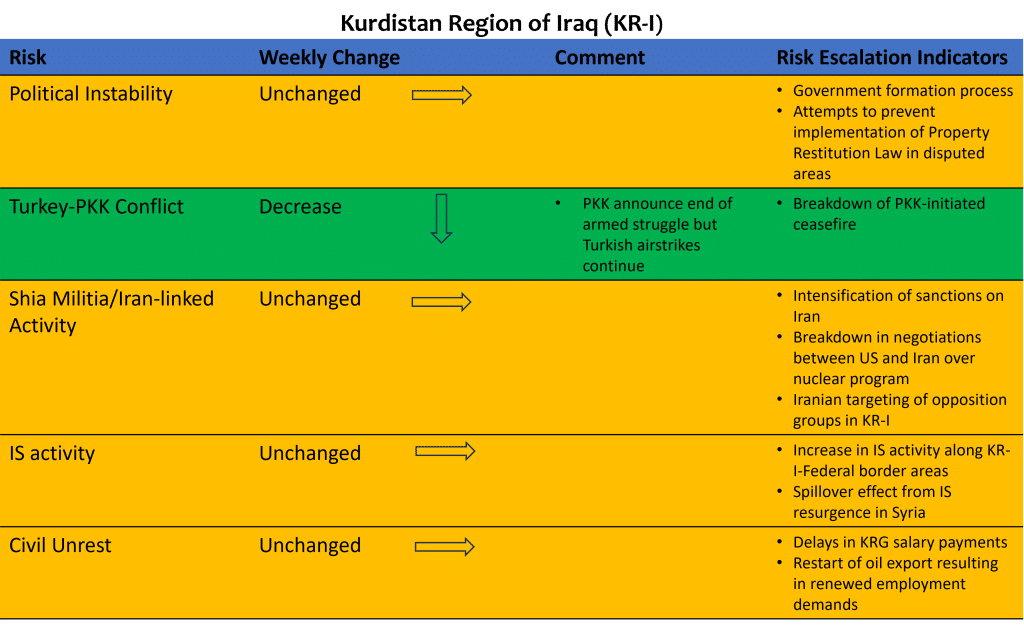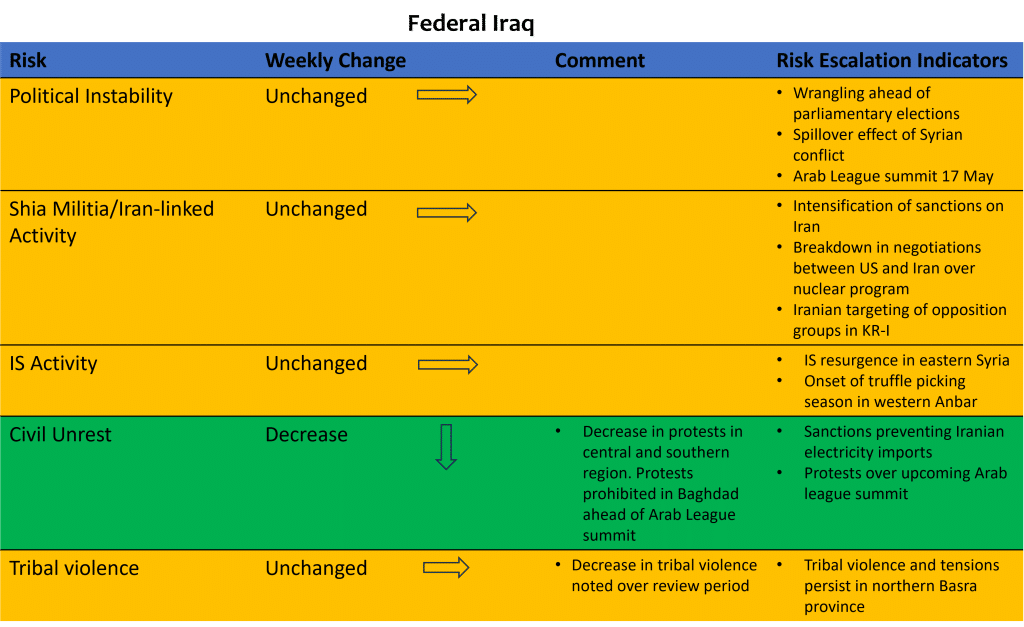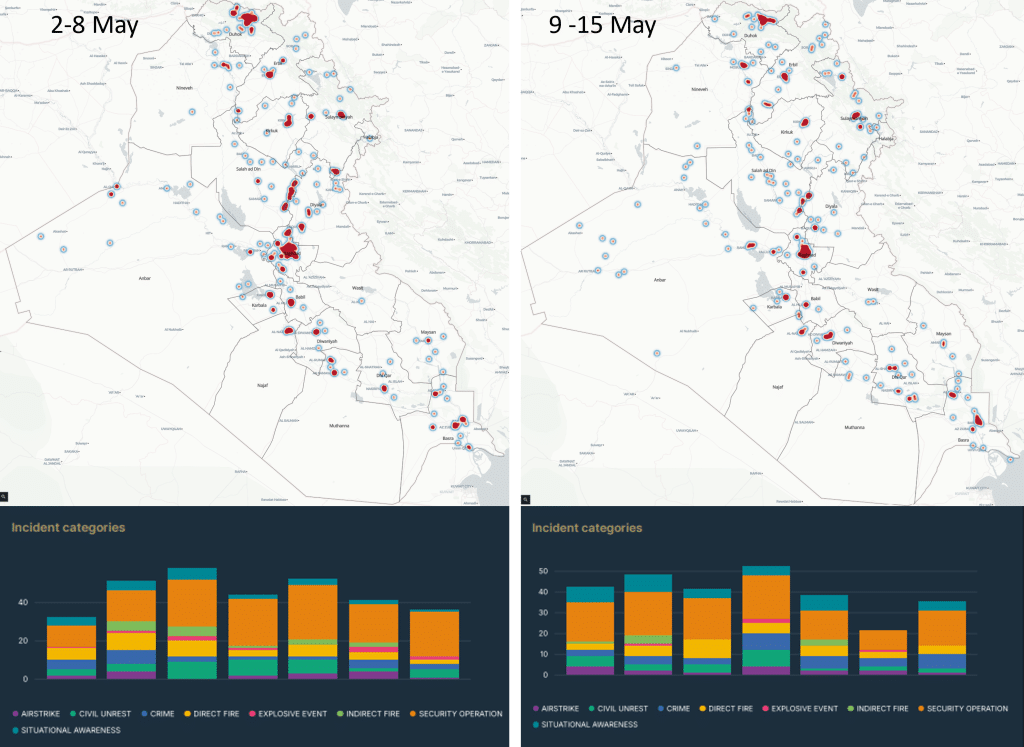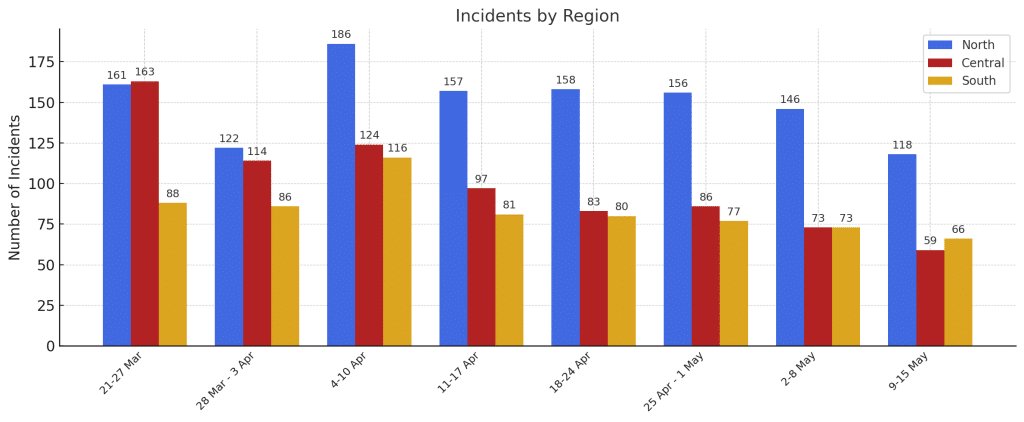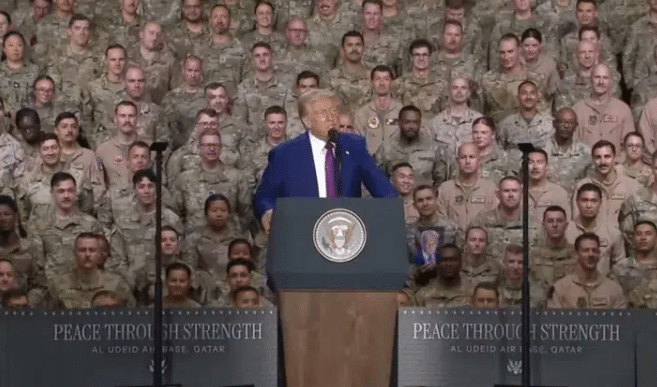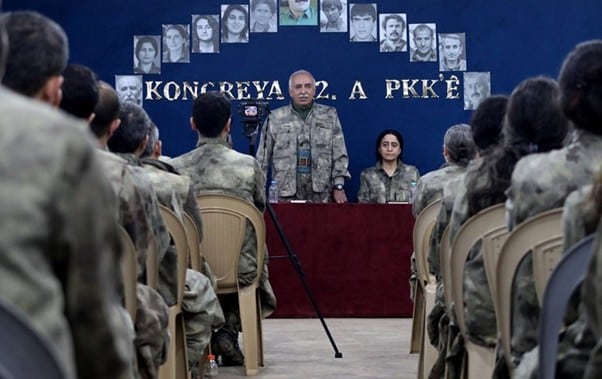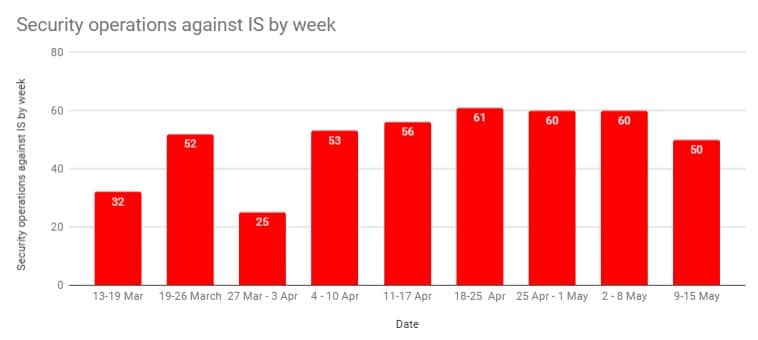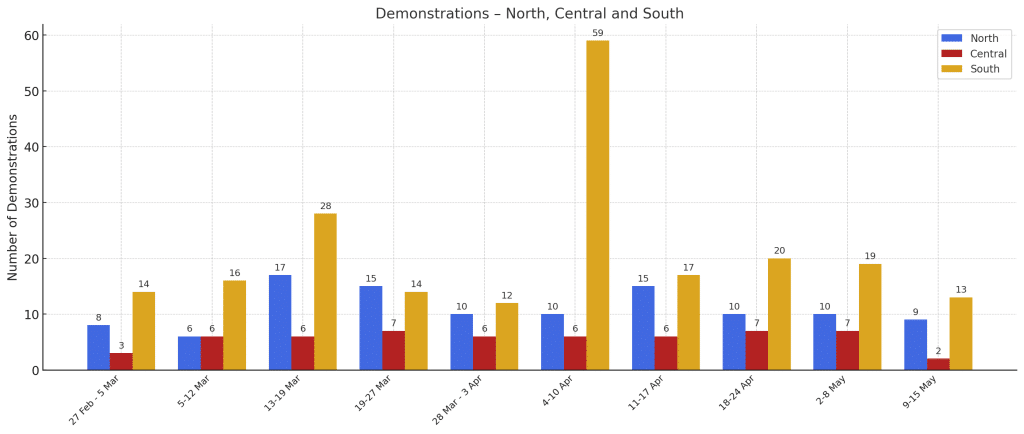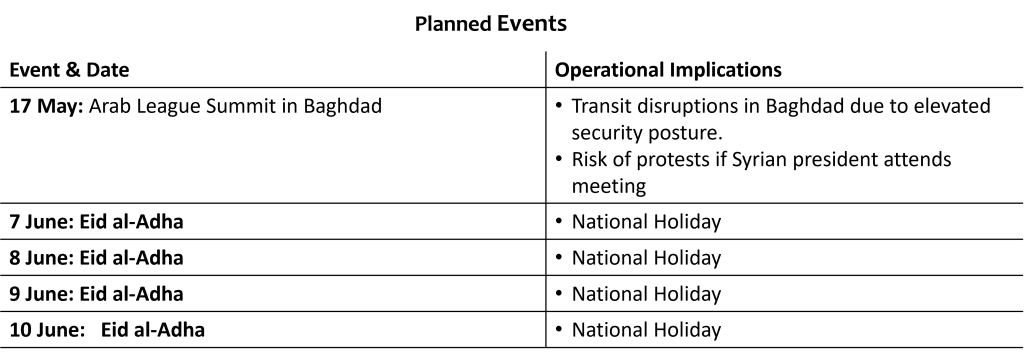Weekly Incident Map
Executive Summary
Nuclear negotiations between the US and Iran show cautious progress
President Trump unveils intent to lift sanctions on Syria
Syrian president declines invitation to Arab League Summit
PKK Announces Dissolution – Turkish Strikes Continue Despite Disarmament Declaration
Turkish military operations continue despite the PKK announcement
ERW detonations and possible IS activity in western Anbar
Local hostilities continue in Baghdad as preparations commence for the Arab League Summit
Persistent Tribal and Criminal Violence Across Southern Iraq
Demos in the South See Limited scuffles and disruptions
Risk Levels, Risk Escalation Indicators & Planned Events
Nuclear negotiations between the US and Iran show cautious progress
The negotiations between the US and Iran over the Iranian nuclear program continue, with public remarks and other reports indicating cautious progress on the matter. Addressing the issue during his visit to the Gulf region this week, US President Donald Trump indicated Iran has “sort of” agreed to a proposal limiting uranium enrichment in exchange for sanctions relief, while Iranian officials signaled conditional willingness depending on regional dynamics and guarantees of civilian-use compliance. According to sources familiar with the talks, significant gaps remain between the two sides, particularly regarding Washington’s reluctance to lift key sanctions and Iran’s insistence on a staged removal of its stockpile of highly enriched uranium. The final destination of the uranium also remains a point of dispute.
President Trump publicly stated during a stop in Doha that Iran had “sort of” agreed to the terms of a deal. He emphasized that the United States’ position is simple: “They cannot have a nuclear weapon.” Trump also dismissed the prospect of military escalation, remarking, “We are not going to make any nuclear dust in Iran,” and suggesting progress toward an agreement might prevent such action. These statements added credence to earlier reports that Special Envoy Steve Witkoff presented a new framework to the Iranian delegation during recent talks in Oman. Iranian Foreign Minister Abbas Araghchi reportedly carried the proposal back to Tehran. Mediators have urged Iran to accept a zero-enrichment policy for up to three years to build international trust, after which enrichment would resume gradually to 3.75%, aligning with the Joint Comprehensive Plan of Action (JCPOA) limit. In the interim, Russia could supply Iran with uranium for civilian nuclear use. Further context and outlook surrounding the talks are provided in our Quick Update Report.
President Trump unveils intent to lift sanctions on Syria
In another significant regional development this week, President Trump said he will be ordering a lifting of “all” US sanctions on Syria. Speaking at an investment forum in Riyadh, Trump said he “will be ordering the cessation of sanctions against Syria in order to give them a chance at greatness” while indicating that “all” sanctions would be lifted on the country. “It’s their time to shine. We’re taking them all off,” Trump said, “Good luck Syria, show us something very special.” The president made the remarks during a regional tour accompanied by a delegation of senior US business leaders and officials to promote US investments and economic engagement in the region.
President Trump’s decision to lift sanctions represents a major policy shift by the US, which, unlike European allies, has been cautious to engage the new government in Damascus. In his remarks on 13 May, President Trump indicated that the decision resulted from discussions with Saudi Crown Prince Bin Salman and President Erdogan, but it was also preceded by more frequent engagement between Syrian and US officials in recent months. In March, the US submitted a list of conditions that would facilitate an easing of restrictions but reports at the time suggested the discussions involved only a partial lifting of restrictions. In this context, President Trump’s order to lift “all” sanctions comes as a surprise.
The timeline and conditions for lifting the restrictions remain somewhat unclear however and details of the meeting with President al-Sharaa remain limited. In his remarks, President Trump did not stipulate any preconditions for removing the sanctions, but the White House Press Secretary Karoline Leavitt later said President Trump urged Syria to diplomatically recognize Israel; expel “foreign terrorists” from Syria; assist the US with counter-terrorism operations, and assume responsibility for IS detention centers in the northeast. To what extent these demands constitute conditions for sanctions relief remains unclear but some of these points were communicated by the US to the Syrian government as conditions to lift restrictions before the meeting on 14 May.
The timeframe is also unclear. The sanctions imposed on Syria involve a very complex set of legal and economic restrictions that date back several decades. While some restrictions can be lifted through presidential decree, others – like the Caesar Syria Civilian Protection Act of 2019 – will require Congressional approval. The designation of Syria as a “state sponsor of terrorism” (made in 1979) will likewise require both legislative and executive approval. With Congress’s position on the matter currently unknown, the timeline may be protracted but the President may proceed to lift those sanctions ordered by executive decree over the near term. For further context and reporting linked to the decision to lift sanctions on Syria, please see Talos’ Syria reporting (available as part of a separate subscription).
Syrian president declines invitation to Arab League Summit
On 12 May, the office of Syria’s interim president Ahmed al-Sharaa announced that he would not be attending the upcoming Arab League Summit in Baghdad. Instead, the government in Damascus will be represented by Foreign Minister Assad al-Shaibani. Iraqi media reports citing Iraqi government officials also confirmed that the interim president would not be attending the summit. No official reason for the declined invitation was provided by the Syrian presidency, but the government sources cited in Iraq denied that the decision was linked to security considerations.
To recall, al-Sharaa’s invitation was met with strong reactions in Iraq due to the interim president’s historical links with al-Qaeda in Iraq. Last month, a large number of Iraqi MPs called for al-Sharaa’s arrest, citing an alleged arrest warrant against him, while demonstrations denouncing the invitation have been reported regularly. This, combined with the Syrian government’s lack of response, fuelled speculation over his attendance and the decision to decline the invitation does not come as a surprise. While this is assessed to reduce the outlook for demonstrations, Foreign Minister al-Shaibani’s attendance is also not unproblematic and his last visit to Baghdad likewise sparked protests. Related dynamics and reactions will therefore be important to monitor in the coming days, with the outlook for demonstrations outside the Syrian embassy in Baghdad and in the southern region assessed as elevated.
PKK Announces Dissolution – Turkish Strikes Continue Despite Disarmament Declaration
On 12 May, the Kurdistan Workers’ Party (PKK) officially announced its dissolution and the end of its armed struggle, formally marking the conclusion of a four-decade insurgency. The decision followed a series of internal congresses and directly echoed Abdullah Ocalan’s 27 February call to disband and pursue a peaceful, democratic path toward Kurdish rights. The move was welcomed as historic by the Turkish government and regional actors, including the Kurdistan Regional Government (KRG), the United Nations, and the U.S. State Department. The Turkish government praised the announcement and Foreign Minister Hakan Fidan described the decision as “historic”. At the same time, the foreign minister said the government would closely monitor what steps the group takes. A spokesperson for President Erdogan wrote on social media platform X that the announcement marks a significant step towards the goal of a “terror-free Turkey.” At the same time, Turkish officials struck a tone of caution by emphasizing that the decision must apply to all PKK-affiliates without exception.
Iraqi Prime Minister Muhammad Shia al-Sudani met with President Recep Tayyip Erdoğan in Ankara on 8 May to discuss the development, culminating in the signing of bilateral defense and economic memoranda. Plans were later confirmed for a high-level meeting in Erbil involving Turkish military and intelligence officials, KRG representatives, and PKK leaders to establish a framework for disarmament and potential reintegration.
The terms, conditions and discussions underpinning the piece initiative remain somewhat unclear as officials on both sides have revealed little in public. To recall, the peace initiative was first launched in October by Devlet Bahceli – a member of the Turkish far-right Nationalist Movement Party and a coalition partner to President Erdogan. At the time, Bahceli discussed the idea of granting Ocalan a conditional release in exchange for the PKK’s dissolution but Turkish government officials have repeatedly insisted that no concessions would be made to the group and that the government demands the PKK’s “unconditional surrender.”
Despite this, multiple sources have discussed a range of possible conditions and concessions that may have facilitated the PKK’s decision, including an amnesty for PKK members and the release of other, high-profile PKK elements currently held in Turkish prisons. Other demands likely focus on ways to enhance Kurdish rights in Turkey, including constitutional amendments to expand Kurdish-language education and easing the crackdown on the DEM Party and other Kurdish constituencies. As of writing, no such concessions have been granted and no significant pieces of legislation, amendments or other measures have been announced by the Turkish government that would explain the PKK’s decision to abide by Ocalan’s call. This is a potential issue as Kurdish leaders and PKK-affiliated elements have recently criticized the Turkish government for not doing enough to facilitate the peace initiative. A continued failure in this regard may set conditions for a resumption in hostilities and set back the process.
Further context and analysis surrounding the PKK’s decision to dissolve are provided in our full report.
Turkish military operations continue despite PKK announcement
Despite this landmark announcement, Turkish military operations against the PKK have continued. Following intense clashes and Turkish strikes from 5 to 8 May—including over 760 artillery rounds and multiple air operations in areas such as Zap, Metina, and Gara—PKK-linked sources claimed four retaliatory drone attacks targeting Turkish forces. Although combat activity initially appeared to decline after 12 May, recent reports indicate that Turkish forces carried out renewed strikes against PKK positions in Duhok province. At least one strike was recorded in Metina on 15 May, with social media footage showing smoke rising from a mountainside. Additional Turkish UAV activity has been observed near PKK support and command locations, including the Qandil Mountain Range along the Erbil-Sulaymaniyah provincial border.
In a statement issued alongside these developments, Rear Admiral Zeki Aktürk, Press and Public Relations Counselor for the Turkish Ministry of Defense, reaffirmed Turkey’s commitment to ongoing military operations against all terrorist organizations threatening Turkey, regional stability, and global security. He confirmed that search and clearance missions would persist in areas known to host PKK elements.
The continuation of Turkish military actions underscores the fragility and complexity of the peace process. PKK leadership has publicly conditioned the disarmament process on reciprocal steps by Turkey, including the improvement of Abdullah Ocalan’s detention conditions and the release of political prisoners such as former HDP leader Selahattin Demirtaş. While Turkey has rejected claims of concessions, the absence of a formal agreement raises concerns about long-term implementation. PKK officials have indicated that the disarmament process could extend up to three months and may be halted if political developments stall.
Although some reduction in combat operations was observed in areas like Zap and Metina, recent events highlight the potential for renewed clashes and emphasize the importance of coordination between all parties. The 15 May meeting in Erbil remains a key moment for shaping a viable demobilization framework. Until a sustained reduction in hostilities is confirmed, client caution is advised in areas of known or suspected PKK presence, especially in northern Duhok and the Erbil-Sulaymaniyah border region.
ERW detonations and possible IS activity in western Anbar
Islamic State (IS) activity remained sporadic but concerning across northern and western Iraq during the latest reporting period, marked by isolated attacks and persistent explosive remnants of war (ERW) threats. On 8 May, a suspected ERW detonation in Shiha village, Wana sub-district, northwest of Mosul, injured three civilians, including two children. The incident underscores ongoing risks in former conflict zones, particularly in areas where IS maintained a long-standing presence. In Anbar, social media sources reported that IS militants allegedly set fire to several lorries in Rutbah on 12 May, targeting vehicles linked to tribal forces. Although the report remains unconfirmed, such attacks highlight IS’s lingering ability to harass security-linked tribal actors. Separately, PMF sources continued to report suspicious IS activity in Wadi Huran, including the movement of cells in 4×4 vehicles to evade detection, reinforcing the need for continued vigilance in western desert areas. Concerningly, IS militants reportedly kidnapped and killed a shepherd in Anbar’s Rutbah district on 15 May, with security responses anticipated over the coming week as a result.
Iraqi security forces carried out several notable operations during the week, including an unconfirmed Iraqi Air Force strike on 11 May targeting IS positions in Kirkuk’s Wadi al-Shay. Follow-up ground operations reportedly resulted in militant casualties, though official confirmation remains absent, raising questions about the scale and outcome of the engagement. In Salah ad Din, Iraqi forces recovered significant IS legacy munitions, including 120mm and 82mm mortars near Bayaji village in Baiji, and indirect fire weapons in Salam al-Jazeera. The Fifth Iraqi Army Division and PMF units also maintained active deployments along the International Highway in western Anbar, focusing on securing Hajj pilgrims. Meanwhile, Iranian-aligned sources reported joint PMF-Army-River Police efforts to prevent cross-border infiltration in western Anbar, including the inspection of lakes and waterways and orders to target unauthorized boat traffic.
Counter-IS operations continued at a steady pace across key provinces, including Salah ad Din, Anbar, and Diyala. Forces remained focused on clearing rural terrain near the Adhaim River and in areas like Jawza, Hawi al-Qal’a, and Hawi al-Adhaim, where IS materials were previously cached. PMF units maintained a visible presence across Ramadi, Hit, Fallujah, and Rutbah, arresting at least five IS-linked suspects. In Haditha, PMF sources reported the arrest of an IS member attempting to pass a checkpoint with forged identification. In Diyala, PMF and Iraqi forces conducted routine raids in northern districts, searching for illegal weapons and wanted individuals. These efforts collectively reflect the sustained emphasis on disrupting IS movement corridors, locating dormant cells, and eliminating residual militant infrastructure in historically contested areas.
Local hostilities continue in Baghdad as preparations commence for Arab League Summit
Hostile activity in Baghdad city and surrounding areas was consistent with long-standing trends and comprised low-level violence linked to family disputes and tribal dynamics. Early on 10 May, social media sources reported a gunfight in the Rashdiyah area of northern Baghdad province that resulted in the death of one individual and injuries to two others. In a later development, the Federal Police Command reported that personnel from the 19th Federal Police Brigade arrested two suspects and seized an AK-47 rifle and a vehicle after the shooting. The police command confirmed that the two wounded individuals later died, bringing the total deceased to three. Around the same time, unnamed security sources reported that a hand grenade targeted the house of a Ministry of Defense member in the Sha’ab area of east Baghdad city due to family-related issues. No casualties were reported. The investigation later revealed that the attacker was the target’s cousin and that the incident stemmed from an inheritance dispute. On the evening of 12 May, social media sources reported that an armed clash occurred in the Mada’in district of southeastern Baghdad province. As a result, one individual was killed but the cause of the clashes was not specified.
Meanwhile, an elevated security posture remains in the capital ahead of the Arab League Summit on 17 May. This week, enhanced security force postures and deployments were reported across the capital, focusing on Baghdad Airport, central Baghdad and high-profile locations. As recently discussed, clients should anticipate an elevated security presence in Baghdad and other urban areas to ensure maximum security before, during, and just after the Arab Summit. Increased security details will also likely be present during the same period while clients are advised to consider possible delays at Baghdad airport, increased traffic congestion and heightened checkpoint scrutiny during the event.
Persistent Tribal and Criminal Violence Across Southern Iraq
Violence across the southern provinces remained consistent, primarily driven by tribal hostilities, familial disputes, and criminal activity. In Basra, a shooting in Khor al-Zubayr left one person seriously wounded, while a separate fatal stabbing occurred in Abu al-Khaseeb. Armed clashes were also reported in northern Basra and Suq al-Shuyukh, with security forces confirming the tribal nature of the incidents. Multiple fatalities were recorded in Hillah, Shatra, Amara, and Uzair-Qurna corridor, with several linked to unresolved tribal feuds. In Najaf, a man murdered his wife during a financial dispute, and in Diwaniyah, a woman attacked her husband with an axe, leaving him in intensive care. Elsewhere in Maysan, a man killed his wife, her cousin, and injured her mother before committing suicide in a family-related incident in Ali al-Sharqi. In a separate episode in Suq al-Shuyukh, gunmen on a motorcycle fatally shot a man outside his residence. In Najaf, authorities discovered the dismembered body of a woman, reportedly buried in multiple locations, in a suspected murder case.
Demos in the South See Limited scuffles and disruptions – Most Events Peaceful
Civil unrest was consistent but largely peaceful, with demonstrators demanding employment, better services, and political accountability. Protest activity was largely recorded in Basra, Muthanna, Babil, Karbala, and Najaf. On 14 May, engineering and geology graduates protested outside the Water Injection Station at the West Qurna-2 Oilfield, demanding employment within the oil FCC project and condemning the invitation of interim Syrian President Ahmed al-Sharaa to the Arab Summit. Protesters accused the Iraqi Government of prioritizing foreign and out-of-province workers while ignoring local engineers and harboring individuals implicated in violence against Iraqis. A brief scuffle occurred between protesters and security forces, and although dozens attempted to storm the facility, they were repelled without further escalation. Additional gatherings near the site remain possible, particularly in response to the Syrian Foreign Minister’s upcoming participation in the 17 May summit.
On 15 May, a disruptive protest was held at Umm Qasr Port, where motorcyclists employed by private companies demanded the reopening of a recently closed road. The closure forced them to use a longer, more dangerous route shared with trucks, increasing the commute from three to seven kilometers. Local sources reported the original road had been shut down due to its use in illegal nighttime vehicle smuggling. Protesters blocked the port access near the railway path, delaying truck traffic and raising the likelihood of further disruption or a security response. Additional protests were also reported in Safwan and Abu al-Khaseeb due to water shortages. In Babil, activist Dhurgham Majid led protests targeting corruption and service failures, while others in Karbala called for justice in the unresolved assassination of activist Ihab al-Wazni. In Wasit and Diwaniyah, power outages and electricity distribution issues triggered further unrest. Though most events remained orderly, minor clashes between protesters and security forces were noted.
Ongoing Security Measures and Arrests Across the Southern Provinces
Security forces maintained a high operational tempo, conducting preventive operations and responding to escalating tribal violence. Notable efforts included raids in Basra’s Jaza’ir area, where six armed men and several women were arrested in a café suspected of illegal activity. In Maysan, Federal Police arrested suspects linked to violent assaults, while security measures were reinforced at the Maysan Oil Refinery. In Najaf, mobile and fixed patrols were deployed in the Wadi al-Salam Cemetery area to manage crowd control and ensure public order. In Dhi Qar, authorities arrested the media director of the Provincial Council for attempted extortion, and in Basra, a murder suspect was apprehended alongside seven associates accused of inciting unrest. In Muthanna, five individuals were arrested for distributing anti-religious leaflets. Security forces also intervened in several tribal clashes, with ongoing operations in Nasr and Suq al-Shuyukh districts following attacks that injured security personnel. Follow-on deployments are expected in violence-prone areas as tensions remain elevated.
Risk Levels, Risk Escalation Indicators & Planned Events
